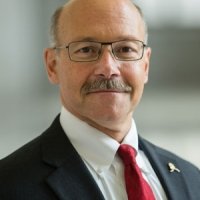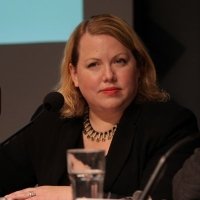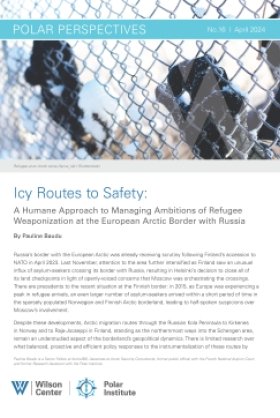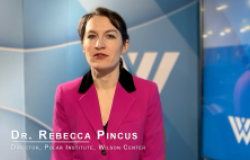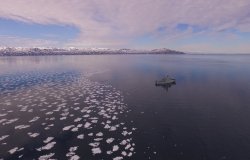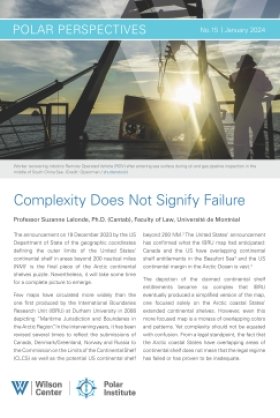Michael Sfraga to Head Wilson Center’s Global Sustainability and Resilience Program
The Wilson Center is pleased to announce the appointment of Dr. Michael Sfraga to lead the Center’s Global Sustainability and Resilience Program. Sfraga, who prior to joining the Wilson Center in 2017 served as Vice Chancellor at the University of Alaska Fairbanks, and affiliate professor at the International Arctic Research Center, will also continue to direct the Wilson Center’s Polar Institute.
PRESS RELEASE
Contact: Ryan McKenna
Phone: (202) 691-4217
ryan.mckenna@wilsoncenter.org
Washington, DC — The Wilson Center is pleased to announce the appointment of Dr. Michael Sfraga to lead the Center’s Global Sustainability and Resilience Program. Sfraga, who prior to joining the Wilson Center in 2017 served as Vice Chancellor at the University of Alaska Fairbanks, and affiliate professor at the International Arctic Research Center, will also continue to direct the Wilson Center’s Polar Institute.
The Wilson Center’s Global Sustainability and Resilience Program is the premiere forum for understanding global risks and building local and regional resilience strategies. It develops transdisciplinary solutions to our transboundary security challenges: energy, environment, health, water, food, natural resources, and livelihoods.
Under the Global Sustainability and Resilience umbrella, Sfraga will administer the Environmental Change and Security Program, the Maternal Health Initiative, and the Urban Sustainability Lab, in addition to the Polar Institute.
“Together, these programs share a transdisciplinary, transboundary focus on some of the most urgent security issues of our time,” said Sfraga.
The programs’ flagship platform, the award-winning daily blog the New Security Beat, will continue to share analysis, storytelling, and news from all of these programs with its global audience. Founded by outgoing Senior Writer/Editor Meaghan Parker in 2007, the New Security Beat will continue to cover the connections between transboundary and transdisciplinary risks and resilience.
“We are pleased to congratulate Meaghan on her new appointment as the Executive Director of the Society of Environmental Journalists. We are deeply grateful for her 15 years of exemplary contributions to the Wilson Center, especially her innovative approaches to communicating complex ideas in the field of environmental security, international development, and global health,” said Sfraga.
Parker launched and supervised the Wilson Center’s first and longest-running blog, The New Security Beat, its first e-newsletter and social media accounts, and its first documentary films, including the award-winning trilogy, “Healthy People, Healthy Environment.”
She was the lead editor and coauthor of the influential research report, “A New Climate for Peace: Taking Action on Climate and Fragility Risks,” which was commissioned by the G7 Foreign Ministers, and more recently co-edited the policy brief, “Building Coastal Resilience to Protect U.S. National Security.”
Since 1994, the Environmental Change and Security Program (ECSP) has actively pursued the connections between the environment, health, population, development, conflict, and security. ECSP brings together scholars, policymakers, media, and practitioners through events, research, publications, multimedia content, and our award-winning blog, New Security Beat. ECSP currently has three primary focus areas: Environmental Security and Peacebuilding, Sustainable Development and Climate Resilience, and Population Dynamics.
Notes to editors:
The Wilson Center provides a strictly nonpartisan space for the worlds of policymaking and scholarship to interact. By conducting relevant and timely research and promoting dialogue from all perspectives, it works to address the critical current and emerging challenges confronting the United States and the world.
Contributors

Global Risk and Resilience Program
The Global Risk and Resilience Program (GRRP) seeks to support the development of inclusive, resilient networks in local communities facing global change. By providing a platform for sharing lessons, mapping knowledge, and linking people and ideas, GRRP and its affiliated programs empower policymakers, practitioners, and community members to participate in the global dialogue on sustainability and resilience. Empowered communities are better able to develop flexible, diverse, and equitable networks of resilience that can improve their health, preserve their natural resources, and build peace between people in a changing world. Read more

Environmental Change and Security Program
The Environmental Change and Security Program (ECSP) explores the connections between environmental change, health, and population dynamics and their links to conflict, human insecurity, and foreign policy. Read more

Polar Institute
Since its inception in 2017, the Polar Institute has become a premier forum for discussion and policy analysis of Arctic and Antarctic issues, and is known in Washington, DC and elsewhere as the Arctic Public Square. The Institute holistically studies the central policy issues facing these regions—with an emphasis on Arctic governance, climate change, economic development, scientific research, security, and Indigenous communities—and communicates trusted analysis to policymakers and other stakeholders. Read more

Maternal Health Initiative
Life and health are the most basic human rights, yet disparities between and within countries continue to grow. No single solution or institution can address the variety of health concerns the world faces. By leveraging, building on, and coordinating the Wilson Center’s strong regional and cross-cutting programming, the Maternal Health Initiative (MHI) promotes dialogue and understanding among practitioners, scholars, community leaders, and policymakers. Read more

Urban Sustainability Laboratory
Since 1991, the Urban Sustainability Laboratory has advanced solutions to urban challenges—such as poverty, exclusion, insecurity, and environmental degradation—by promoting evidence-based research to support sustainable, equitable and peaceful cities. Read more
